Author: CryptoVizArt, UkuriaOC, Glassnode; Compiler: Deng Tong, Golden Finance
Summary
With the emergence of the Runes protocol, a counter-intuitive divergence has formed between the decline in active addresses and the increase in the number of transactions.
Major token entities now hold a staggering ~4.23 million BTC, more than 27% of the adjusted supply, and US spot ETFs now hold a balance of 862,000 BTC.
Spot and hedging structures appear to be important sources of ETF inflow demand, with ETFs used as a tool to gain long spot exposure, while net short positions in Bitcoin in the CME Group futures market are growing.
Decreasing Active Addresses and Increasing Network Processing Transactions
On-chain activity metrics such as active addresses, transactions, and transaction volume provide a valuable toolkit for analyzing the growth and performance of blockchain networks. When restrictions on Bitcoin mining were implemented in mid-2021, the number of active addresses on the Bitcoin network fell sharply, from over ~1.1 million per day to just ~800,000 per day.
The Bitcoin network is currently experiencing a similar contraction in network activity, albeit driven by entirely different factors. In the following sections, we will explore how the emergence of Inscriptions, Ordinals, BRC-20, and Runes significantly changes how on-chain analysts view future activity metrics.
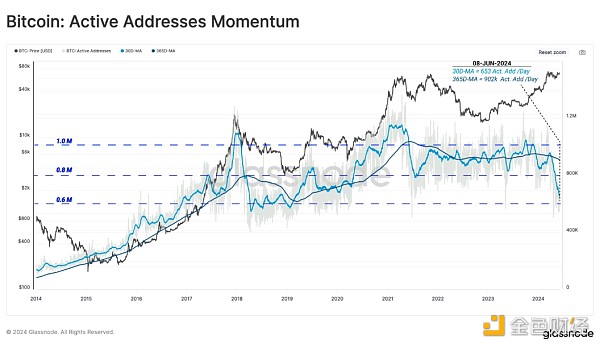
Despite strong market momentum, increasing active addresses and daily transactions, this trend is deviating.
While active addresses appear to be decreasing, the number of transactions processed by the network is close to a record high. The current monthly average transaction volume is 617k/day, 31% higher than the annual average, indicating a relatively high demand for Bitcoin block space.
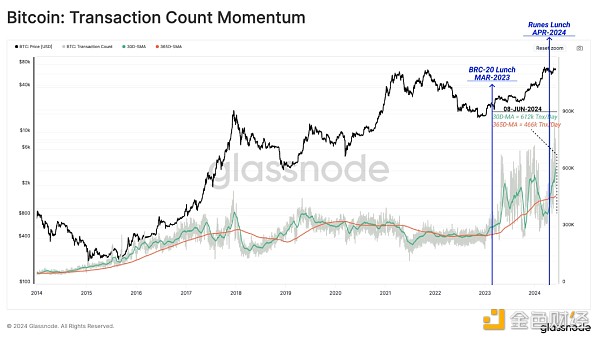
If we compare the recent drop in active addresses to the share of transactions for inscriptions and BRC-20 tokens, we can observe a strong correlation. Notably, the number of inscriptions has also dropped sharply since mid-April.
This suggests that the initial driver of the drop in address activity was primarily due to a decrease in the use of inscriptions and ordinals. It is worth noting that many wallets and protocols within the industry reuse addresses and are not double-counted if an address is active more than once in a day. So if an address generates ten transactions a day, it will appear as an active address, but there are actually ten transactions.
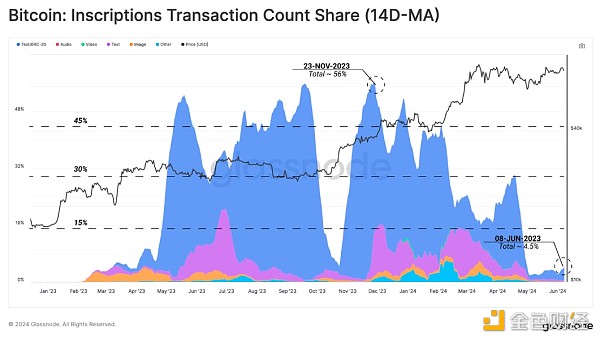
To illustrate how inscriptions have grown since the beginning of 2023, we can see how the total number of cumulative inscriptions has expanded. As of the time of writing, the number of inscriptions has reached 71 million, however, the popularity of the protocol has declined significantly since mid-April of this year.
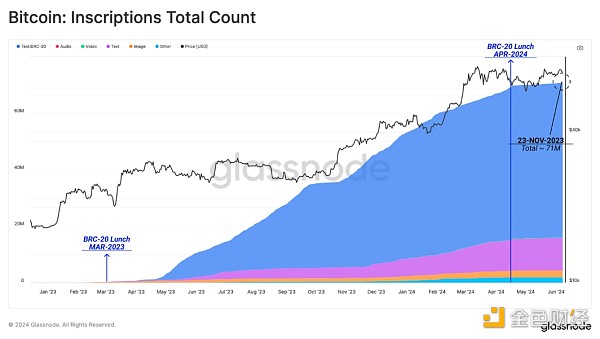
To explain the drop in inscription activity, we have to highlight the emergence of the Runes protocol, which claims to be a more efficient way to introduce fungible tokens on Bitcoin. Runes went live on the halving block, which explains the drop in inscriptions in mid-April.
Runes follow a different mechanism than inscriptions and BRC-20 tokens, utilizing the OP_RETURN field (80 bytes). This allows the protocol to encode arbitrary data into the chain while requiring less block space.
With the launch of the Runes protocol at the time of the halving (April 20, 2024), demand for Runes trading soared to between 600,000 and 800,000 per day and has remained high since then.
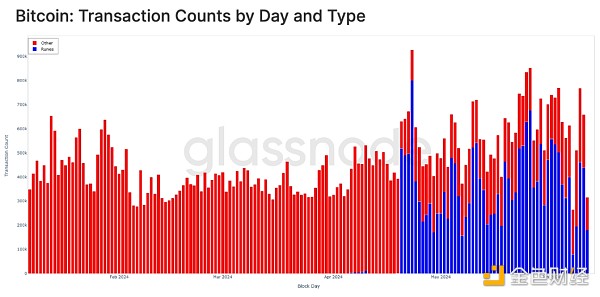
Rune-related transactions have now largely replaced BRC-20 tokens as well as Ordinals and Inscriptions, accounting for 57.2% of daily transactions. This suggests that collectors' speculation may have shifted from Inscriptions to the Rune market.
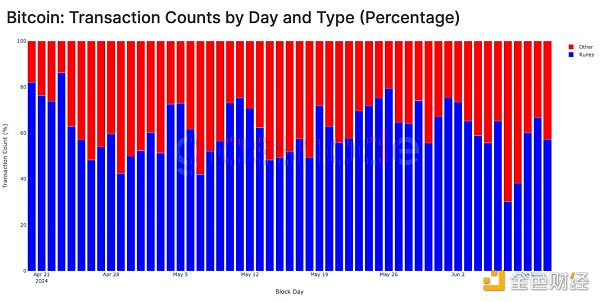
ETF Demand Diverges
Another divergence that has recently attracted attention is that despite the staggering inflows into US spot ETFs, prices have stagnated and moved sideways. To identify and assess the demand side of ETFs, we can compare ETF balances (862k BTC) with other major entities.
US Spot ETFs = 862k BTC
Mt. Gox Trustee = 141k BTC
US Government = 207k BTC
All Exchanges = 2.3M BTC
Miners (excluding Patoshi) = 706k BTC
The combined balance of all these entities is estimated to be around 4.23M, or 27% of the overall adjusted circulating supply (i.e. total supply minus tokens that have been idle for more than seven years).
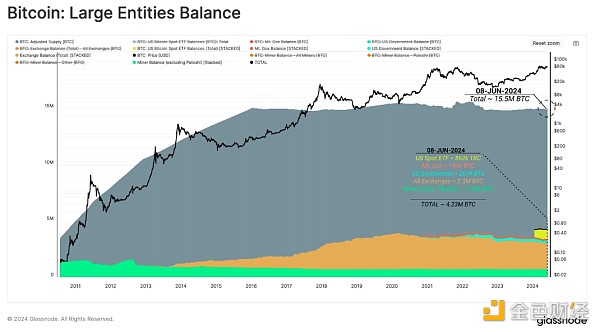
Coinbase as an entity holds a large amount of total exchange balances as well as US spot ETF balances through its custody service. The Coinbase exchange and Coinbase custody entity currently hold approximately 270,000 and 569,000 BTC respectively.
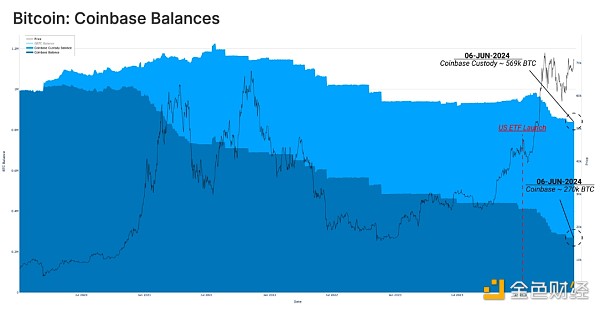
As Coinbase serves both ETF clients and traditional on-chain asset holders, the importance of exchanges in the market pricing process has become apparent. By assessing the number of whales depositing to the Coinbase exchange wallet, we can see a significant increase in deposit volume after the ETF launch.
However, we note that a large portion of deposits are associated with outflows from the GBTC address cluster, which has been a long-standing supply overhead throughout the year.
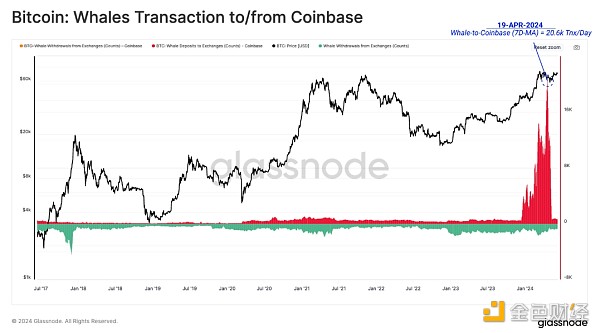
In addition to the selling pressure of GBTC when the market rebounded to a new high, there is another factor that has recently led to a weakening of demand pressure for US spot ETFs.
Looking at the CME Group futures market, open interest has stabilized at more than $8 billion, after hitting a record high of $11.5 billion in March 2024. This may indicate that more and more traditional market traders are adopting spot arbitrage strategies.
This arbitrage involves a market neutral position that combines the purchase of a long spot position with the sale (short) of a futures contract position of the same underlying asset that trades at a premium.
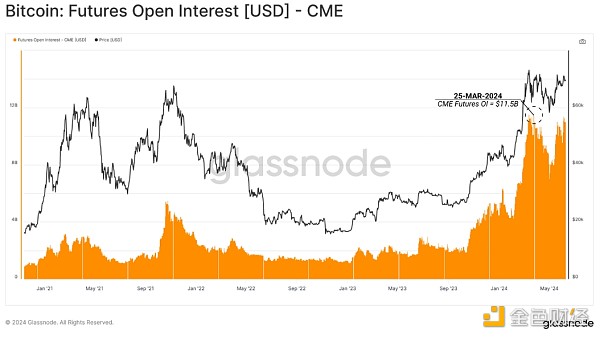
We can see that entities classified as hedge funds are building increasingly large net short positions in Bitcoin.
This suggests that the spot arbitrage trade structure may be an important source of demand for ETF inflows, where the ETF is a vehicle to gain long spot exposure. CME Group has also seen a significant increase in open interest and overall market dominance since 2023, suggesting it is becoming the preferred venue for hedge funds to short futures via CME.
Hedge funds currently have a net short position of $6.33 billion and $97 million in the CME Bitcoin and Micro CME Bitcoin markets, respectively.
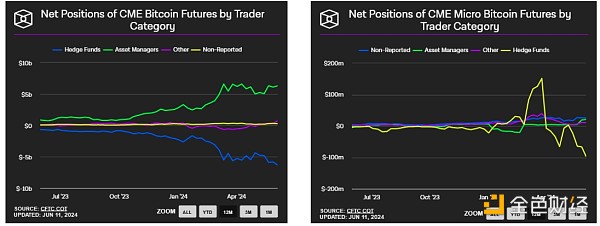
Summary
The large divergence between activity metrics has been accelerated by the extreme popularity of the Runes protocol, which exploits a large amount of address reuse, with a single address generating multiple transactions.
The emergence and size of spot arbitrage trades between long US cash ETF products and short futures through CME Group have largely dampened buy-side inflows into ETFs. This has had a relatively neutral impact on market prices, suggesting that organic buyers from non-arbitrage demand are needed to further stimulate positive price action.
 JinseFinance
JinseFinance
 JinseFinance
JinseFinance JinseFinance
JinseFinance JinseFinance
JinseFinance JinseFinance
JinseFinance Joy
Joy Bitcoinist
Bitcoinist Coindesk
Coindesk Bitcoinist
Bitcoinist Bitcoinist
Bitcoinist Cointelegraph
Cointelegraph